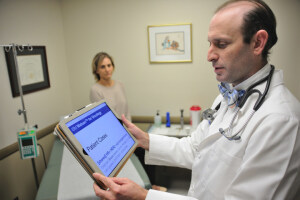by
Sridhar Nadamuni, Contributing Reporter | February 01, 2017

Dr. Abraham Schwarzberg, chief of
oncology at Jupiter Medical Center
in Palm Beach County, Florida, reviews
recommendations generated by IBM
Watson for Oncology.
A regional facility in South Florida has become the first community medical center in the U.S. to adopt a cognitive computing platform in an effort to boost outcomes of patients afflicted with cancer.
“IBM’s technology, Watson for Oncology, will be provided to oncologists at Jupiter Medical Center to help doctors make personalized, evidence-based treatment decisions for their patients,” Dr. Andrew Norden, MPH, MBA, deputy chief health officer, IBM Watson Health, told HCB News. “For IBM, this is an important milestone as it is the first adoption of Watson for Oncology to support community oncologists in the U.S.”
Norden commented that “as the industry moves toward value-based care, the need to make care decisions based on evidence is increasingly important.” However, “oncologists are inundated with some 50,000 new cancer studies every year and medical information is doubling every two years.”
According to the American Cancer Society, an estimated 1.7 million new cancer cases are diagnosed annually in the U.S., with 125,000 in Florida alone. While the need for oncologists is increasing by 40 percent, the supply of oncologists is only increasing by 25 percent, resulting in a shortfall of more than 2,200 oncologists by 2025 nationwide.
Developed by IBM and trained by experts at Memorial Sloan Kettering Cancer Center (MSK) in New York, the program draws upon over 300 medical journals, 200-plus textbooks, and almost 15 million pages of text to provide a rapid and evidence-based approach to the management of patients with cancer.
Last December, at the San Antonio Breast Cancer Symposium in Texas,
a study was presented comparing the results of Watson for Oncology with the determinations of oncologists at Manipal Hospitals in Bengaluru, India. The researchers reviewed a total of 638 breast cancer patients and found that the oncologists agreed with Watson recommendations 90 percent of the time.
According to that presentation, Watson took a mere 40 seconds to collect and review the information and come up with a diagnosis.
According to Norden, “Jupiter selected Watson for Oncology because of its ability to help physicians personalize patient care” combining the sophistication and expertise of MSK and harnessing the “insights from the world’s collective body of cancer knowledge to their own community of providers.” It facilitates summarizing of patient records, scoring and ranking of medical literature, and optimizing the oncology expertise available.
“Watson for Oncology supports six cancer types (breast, lung, colorectal, gastric, ovarian, and cervical cancers), and IBM plans to train Watson on nine more cancer types by the end of the year," Norden added, "so it will be capable of supporting clinical decisions for nearly 80 percent of the worldwide prevalence of cancer.”
In China,
21 hospitals are slated to begin utilizing the sophisticated cognitive computing system.
“We are developing Watson offerings to support a number of other important health care challenges,” said Norden. “For example, IBM and Medtronic are creating a cognitive diabetes app and Watson Health is partnering with more than a dozen organizations to create cognitive imaging offerings — technology tools that can help radiologists and other doctors interpret medical images.”
Watson’s evidence, based on peer-reviewed studies and clinical guidelines, is constantly being updated.
